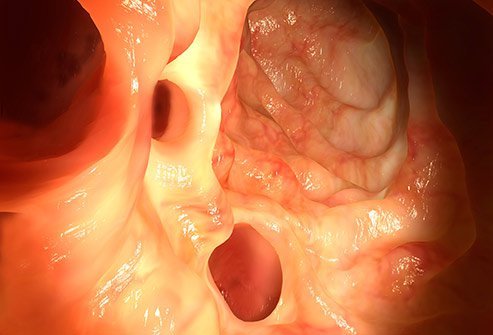What Triggers Diverticulitis?

The exact cause of diverticulitis is unknown. Research suggests that several factors are associated with diverticulitis:
- Dietary fiber: It was previously believed that a low-fiber diet may cause diverticulitis. Newer studies have revealed that a high-fiber diet with frequent bowel movements can also cause diverticulosis. Because the effect and requirement of fiber in the diet may vary from person to person, one must consult their doctor about how much fiber they need to include in their diet.
- Aging: The risk of diverticulitis increases with age. Recent studies have reported that about 35% of adults aged 50 years or younger have diverticulosis in the United States, whereas about 58% of US adults older than 60 years have diverticulosis.
- Genes: Research suggests that there might be a role of genetics in causing diverticulitis.
- Being overweight or obese
- High-fat diet
- Diet rich in red meat
- Smoking
- Lack of exercise
- Certain drugs such as ibuprofen, aspirin, opioids, and steroids
What is diverticulitis?
Diverticula are small outgrowths (pouches) that develop in the large intestine in some individuals. These pockets or diverticula push out through the weak spots in the intestine. When these pouches get inflamed (swollen), the condition is called diverticulitis. It may be due to an infection or other causes. They are commonly seen in the lower part of the colon (sigmoid colon). Diverticulosis is normally a harmless condition and does not produce any symptoms or require any treatment. In some persons, however, it may get infected and cause health problems. The risk of diverticulitis increases with age. Around 200,000 people are hospitalized for diverticulitis each year in the United States.
Diverticulitis, if left untreated, can lead to many complications:
- Abscess: It is a painful, swollen, infected, and pus-filled area just outside the colon wall. It may cause fever, nausea, vomiting, and severe abdominal pain.
- Bowel obstruction: Diverticulitis may cause partial or complete obstruction of the intestine.
- Perforation: It refers to a small hole or tear in the colon.
- Peritonitis: It is the inflammation or infection of the lining of the abdomen. It presents as fever and severe abdominal pain.
- Fistula: It refers to an abnormal passage between two organs or between an organ and the outside of the body.
What does an attack of diverticulitis feel like?
Diverticulitis can cause the following symptoms:
- Pain is usually felt on the left side of the lower abdomen. It may occur on the right side of the abdomen in some people.
- Fever
- Chills
- Diarrhea or constipation
- Nausea with or without vomiting
Are bananas good for diverticulitis?
High-fiber foods such as bananas are good for diverticulitis (unless they are prohibited due to other reasons). Diet should include less of fried or fatty foods and red meat. Other foods that may help in diverticulitis are as follows:
- Fruits including apples, peaches, pears, and tangerines
- Lettuce
- Boiled/baked and peeled potatoes
- Vegetable juices
- Mushrooms
- Soft cooked vegetables such as sweet potatoes, asparagus, beets, turnips, pumpkin, broccoli, artichokes, lima beans, carrots, and squash
- High-fiber cereals such as shredded wheat
- Hot cereals such as oatmeal, farina, and cream of wheat
- Quinoa
- Whole-grain breads such as whole wheat or whole rye bread
